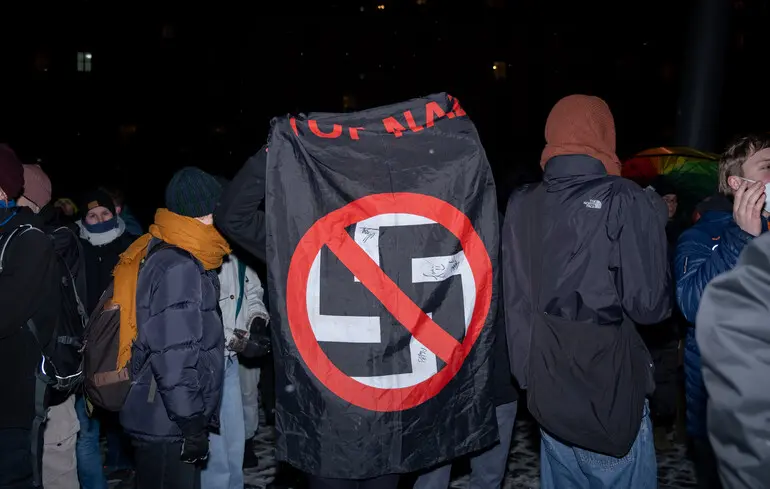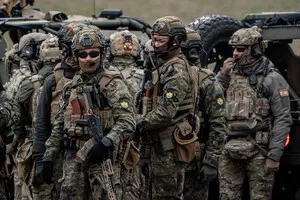AfD Rise Shows Germans Not Immune Right-Wing Extremism

Germany’s new coalition government is set to begin its term. “Germany is back on track,” said presumptive Chancellor Friedrich Merz on April 9. Meanwhile, for the first time, the far-right nationalist party Alternative für Deutschland (AfD) took the lead in an opinion poll with 25%. Merz’s Christian Democrats came only second with 24%. How did we get into this situation? And what does it mean for Germany and beyond?
The AfD has been on a seemingly unstoppable ascent. In 2023, it won mayoral elections in Lebus, Raguhn-Jeßnitz, and Pirna, and in 2024 in the Eastern regional (Länder) elections. It came first in Thuringia and second in Saxony and Brandenburg. In the national elections in February 2025, it won majorities in the Eastern Länder. Nationwide, 21% of voters aged 18 to 24 supported the AfD in February.
Germany has long been portrayed as a model for confronting a terrible history. Timothy Garton Ash, a British historian, wrote in 2011 that German Geschichtsaufarbeitung, or working through the past, had been successful: “Contemporary Germany offers the gold standard for dealing with a difficult past.”
German historian Jan Werner Mueller pointed out in 2010 that “Germany is still one of the few European countries without a successful populist rightwing party.”
He argued that, in the aftermath of Nazism, nationalism had been thoroughly discredited.
Now, 15 years later, AfD leads in the polls. In 2024, 55% of Germans in an opinion poll supported “fully” or “partially” drawing a line under the Nazi past, a 2% raise from 2020. Indeed, few countries so thoroughly addressed their past crimes as Germany. Admittedly, Germany has more to reckon with than most nations. Also true that we had to lose not one but two world wars, and it wasn’t enough, we still needed a push from the Allied powers after 1945. But then an impressive process started. The denazification Germans underwent after World War II, under allied pressure, was followed by the 1968 student revolt. 1968 was to a large extent children revolting against their parents’ unacknowledged Nazi past. When the 1968 activists made their way into the political establishment, rejecting Nazism became an even stronger part of German identity.
Yet the process was uneven, at times devolving into ritual, and geographically incomplete across Germany: the East was a very different story. Let’s first look at the West before German reunification in 1990. Denazification was, in spite of its massive scale, incomplete. There were exceptions for able specialists. The pressure of the U.S. relented when the Cold War began, and Washington needed German human resources. The 1968 revolt aimed to challenge unacknowledged Nazi continuities among the elites. It put anti-Nazism at the core of German self-understanding. And the “1968ers” institutionalized this in education for future generations and in memorialization.
Their children from the 1970s on learned about the Nazi past and acknowledging responsibility. But as historian Jan Werner Mueller noted in 2010, overly institutionalized remembrance can mean that, “in a perverse twist…, whoever goes through the motions of remembrance need not feel bad or guilty.” Also, there were adverse reactions from some conservatives who found the Nazi past was put too much in the center of everything. And lastly, though mostly a fringe phenomenon, right-wing radicalism was never dead in German politics: for example, the Nationaldemokratische Partei Deutschlands (NPD) got in a Länder election in Baden-Württemberg in 1964 9.8%, the Republikaner in 1992 10.9%.
East Germany, the GDR, was still a different story.
East Germany never underwent a comparable reckoning with the Nazi past, in spite of all shortcomings in the Westen part. The GDR positioned itself as anti-fascist. It attacked West Germany as being run by elites with Nazi past. But the truth was that in the Soviet occupation zone of Germany, denazification was first implemented strictly in 1945, but also used as a pretext to subjugate critics of the new regime. And soon, able administrators with a Nazi past were pragmatically rehabilitated. The GDR experienced no 1968-style revolt or transformation.
East German society did not go through the generational conflict about the Nazi past since the GDR declared itself anti-fascist by definition, casting West Germany as the true heir to Nazism.
East Germans were taught to believe the official lie that their state had no Nazi legacy problem. And GDR citizens after Nazi rule moved straight to socialist dictatorship.
From 1990, these Eastern Germans were again part of the reunified Germany. Instead of the country working with them through their past, they experienced one more traumatic experience. They gained freedom and access to a prosperous welfare state. However, the “victorious” West discarded and disrespected the GDR and its citizens' life stories as a historical aberration. Economic transformation hit East Germans hard. Many of the more entrepreneurial citizens left the East to start anew in the West.
So, reunified Germany, on the one hand, defined itself in a deep and systematic way against right-wing radicalism. Acknowledging its Nazi past was part of its DNA.
Yet even in the West, denazification was inconsistent. The “never again” ethos institutionalized after 1968 may not have created a living presence in everyone’s hearts and minds.
The Eastern Bundesländer had not really undergone such a process at all. Instead, they experienced seamless dictatorship and a summary dismissal by the West after reunification.
That was reunified Germany.
In the years and decades after 1990, German mainstream elites continued to define their country by rejecting right-wing radicalism. But a growing minority began to dissent. Large-scale migration after the Arab Spring, combined with Angela Merkel’s decision to open Germany’s borders, fueled anti-migrant sentiment. In COVID times, conspiracy theories against the political elites spread. Stagnant economic growth, especially in the East, fueled resentment toward those in power.
The social media revolution empowered radical voices and left traditional parties flat-footed.
Also, xenophobic violence, while sporadic, never went away: The anti-immigrant riots in Hoyerswerda in 1991, the killings of Nationalsozialistischer Untergrund (NSU) between 2000 and 2007, or the racially motivated shooting in Hanau in 2020 were some of the most prominent examples. Anti-semitic violence rose (though also related to Muslim immigration). There were scandals about right-wing radicals in the police.
The AfD appears to have successfully channeled these social undercurrents and dissatisfactions into the political momentum it now commands, allegedly with communication and disinformation support from Russia, with which the AfD sympathizes.
In opinion polls during federal elections, 55% of Germans said that the AfD had understood better than others that citizens did not feel safe anymore. 46% said they found it good that the AfD wanted to limit migration more than other parties. Both were up compared to 43% and 35%, respectively, from 2021. Many seem to think the established parties do nothing, so the AfD is the last chance - and the ultimate protest.
The AfD distances itself from Nazism but deliberately stays in a gray zone. Party founding member and former co-head of the parliamentary group Alexander Gauland said in 2018 that 12 years of Nazi history were “only a piece of bird shit compared over 1,000 years of German history.”
The head of Thuringia’s AfD, Björn Höcke, was sentenced in 2024 for voicing the first two words of an SA slogan, “Alles für…” (“Everything for…”), which the audience completed with “Deutschland!” – “Everything for Germany.”
At the same time, both figures demonstratively distance themselves from Nazism. AfD constantly tests and expands the borders of what can be said in Germany, where extremist language is a criminal offense.
Germany is now somewhat alike other Western countries, where similar right and far-right political movements gain voters. They claim that only they will control migration, create security, and stop abuse of the social system, which traditional parties fail to address. Most of them are friendly to Russia, from which many say they get assistance in communication and disinformation.
So, Germany is no longer exceptional, except for its Nazi past.
A part of the political spectrum, e.g. prominently U.S. Vice President J.D. Vance, says that AfD represents an important part of the electorate, and it is undemocratic to shut them out. Calling the AfD Nazis, goes the argument, is a trick of the establishment to keep them out of power. To block the very party that, they say, will address today’s challenges decisively.
Others see the same reality from an opposite angle. Those saying AfD is normal want to normalize their radical right-wing positions. From Germany, one must learn what such a normalization can lead to.
So Germany is a special political battleground. There was only one Drittes Reich and one Holocaust. The EU was founded to make war in Europe impossible by integrating Germany. NATO was founded to “keep the Russians out, the Americans in and the Germans down.”
Now, different from what many thought, Germans turned out not to be vaccinated against right-wing radicalism. We are open, like others, to xenophobes who want to destroy the established democratic system.
AfD’s rise shows that no learning from the past replaces action and taking risks in the present. And the best political notions can ossify. Germany’s incoming government has the immense responsibility of proving that learning historical lessons need not slow progress but can enable more effective (and electorally appealing) problem-solving.
It is absolutely vital that Germany “is back on track” - the good Germany.
Please select it with the mouse and press Ctrl+Enter or Submit a bug















 Login with Google
Login with Google